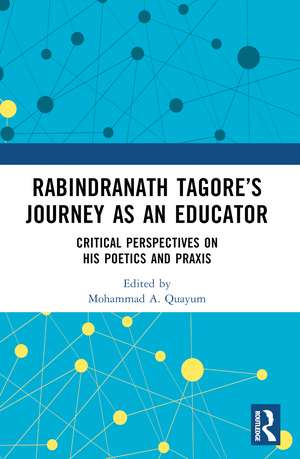Rabindranath Tagore’s Journey as an Educator: Critical Perspectives on His Poetics and Praxis
Editat de Mohammad A. Quayumen Limba Engleză Paperback – 26 aug 2024
It juxtaposes the educational systems and institutions set up by the British colonial administration with Tagore’s pedagogical vision and schools in Santiniketan, West Bengal—Brahmacharya Asram (1901), Visva-Bharati University (1921) and Sriniketan Institute of Village Reconstruction (1922). An educational pioneer and a poet-teacher, Tagore combined nature and culture, tradition and modernity, East and West, in formulating his educational methodology. The essays in this volume analyse the relevance of his theories and practice in encouraging greater cultural exchange and the dissolution of the walls between classrooms and communities.
This book will be useful for scholars and researchers of education, Tagore studies, literature, cultural studies, sociology of education, South Asian studies and colonial and postcolonial studies.
| Toate formatele și edițiile | Preț | Express |
|---|---|---|
| Paperback (1) | 395.04 lei 6-8 săpt. | |
| Taylor & Francis – 26 aug 2024 | 395.04 lei 6-8 săpt. | |
| Hardback (1) | 901.31 lei 6-8 săpt. | |
| Taylor & Francis – 20 dec 2022 | 901.31 lei 6-8 săpt. |
Preț: 395.04 lei
Nou
Puncte Express: 593
Preț estimativ în valută:
75.59€ • 79.15$ • 62.70£
75.59€ • 79.15$ • 62.70£
Carte tipărită la comandă
Livrare economică 10-24 aprilie
Preluare comenzi: 021 569.72.76
Specificații
ISBN-13: 9780367744281
ISBN-10: 0367744287
Pagini: 314
Dimensiuni: 156 x 234 mm
Greutate: 0.58 kg
Ediția:1
Editura: Taylor & Francis
Colecția Routledge India
Locul publicării:Oxford, United Kingdom
ISBN-10: 0367744287
Pagini: 314
Dimensiuni: 156 x 234 mm
Greutate: 0.58 kg
Ediția:1
Editura: Taylor & Francis
Colecția Routledge India
Locul publicării:Oxford, United Kingdom
Public țintă
Academic and PostgraduateCuprins
Introduction Part I: Tagore vis-s-vis Other Educational Thinkers 1. Tagore and Montaigne: Exponents of Modern, Moral Education 2. The Educational Paradigms of Tagore and Rousseau: A Critical Comparison 3. Tagore and Morris: Education for Utopia 4. Tagore and Gandhi: An Inclusive Approach to Open Education 5. Tagore and Rokeya: Autodidacts as Educational Pioneers Part II: Tagore’s Educational Ideals 6. Tagore’s Educational Philosophy: Entwined Theory and Practice 7. Education for Tomorrow: The Vision of Rabindranath Tagore 8. Never Not an Educator: Tagore as a Poet-Teacher 9. Towards the Symbol of a Missing Fullness: The Place of Travel and Education in Tagore’s World Vision 10. Tagore: Education for Personal Freedom and Self-fulfilment 11. Educating Imagined Communities: Tagore’s Pedagogical Vision 12. Rabindranath Tagore, Imaginative Literature and Educating the Child: A Study 13. Approaching the Poet’s School: Colonial Modernity, Inclusive Development and Tagore’s Philosophy of Education 14. Educational Takeaways from Tagore’s Drama Achalayatan Part III: Tagore’s Educational Experiments 15. The Educational Paradigms in the Santiniketan School through the Lens of Continental Pedagogy 16. Rabindranath Tagore and the Idea of a Green University 17. Sriniketan Experiment: Emergence of Community Immersion as a Pedagogical Tool? 18. Rolf Schoembs Vidyashram: A Santal School Strives to Follow Tagore’s Vision Notes on Contributors Index
Notă biografică
Mohammad A. Quayum is an Honorary Professor at Flinders University, Australia and has taught at universities in Australia, Bangladesh, Malaysia, Singapore and the US. He has published extensively on American literature, Asian Anglophone literature and Bengali literature. His recent publications include Reading Malaysian Literature in English: Ethnicity, Gender, Diaspora, and Nationalism (2021), Bangladeshi Literature in English: A Critical Anthology (2021), Tagore Nationalism and Cosmopolitanism (2020), Beyond Boundaries: Critical Essays on Rabindranath Tagore (2014) and One Sky, Many Horizons: Studies in Malaysian Literature in English (2014).
Descriere
This book looks at Rabindranath Tagore’s, experiments and journey as an educator and the influence of humanistic worldviews, nationalism and cosmopolitanism in his philosophy of education.
